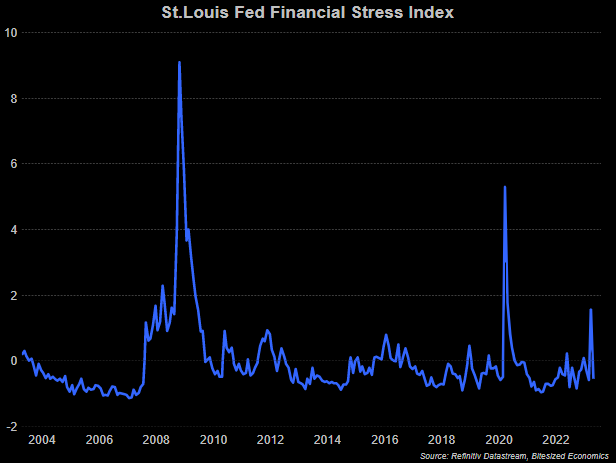Should we still be worried about the banking sector?
Last week, St.Louis Fed President Bullard in a media interview spoke about his own Federal Reserve bank’s indicator - the St. Louis Fed’s financial stress index. The index uses a range of indicators on financial market conditions, including interest rates and yield spreads.
Bullard pointed out that the index was back at zero, suggesting that we’re not about to get into a major financial crisis. The index is designed so that zero represents “normal financial conditions”.

You can see that the index has fallen from a recent peak on March 21, after the collapse of Silicon Valley Bank, Silvergate Bank, Signature Bank and the forced buyout of Credit Suisse.
However, this week, concerns have arisen again with First Republic reporting a collapse in their deposits or a need to recapitalize.
With these latest issues, it does bring up the question - how systemic are the problems within the banking sector?
Whether stresses are ongoing will depend on whether these bank failures are isolated cases that can be blamed on poor management or if the concerns facing the financial system are part of a systemic-wide problem. The former would mean that we could move on, but the latter would mean that the problem will likely continue to re-surface somewhere again.
In answering this question, it is probably a bit of both.
Credit Suisse’s problems do appear to be firm-specific and related to scandals and a slow exodus of customers over the past few years. Reports suggest that Silicon Valley Bank lacked adequate risk management and its concentration of customers with large uninsured deposits linked to one sector made it vulnerable to a bank run. That would also suggest one-off factors for SVB, although there were similar concerns with Silvergate, Signature and now First Republic.
One potential systemic issue is that deposit holdings of over $250,000 are not guaranteed by the Federal Deposit Insurance Corporation (FDIC). That was not a problem before Silicon Valley Bank’s collapse but given how rapidly deposits have left the failed banks, it has clearly become a problem.
Although all deposit holders at the failed banks were given full protection, a blanket deposit guarantee requires the approval of Congress, and appears to be facing resistance.
Increasingly, there will be calls for a widespread blanket guarantee, otherwise further bank failures and/or mergers within the banking sector might be necessary. Without a blanket deposit guarantee, US banks could remain vulnerable to large deposit outflows, particularly smaller banks with large uninsured deposit holders and regardless of whether they are solvent or not. First Republic, which has required already received an injection of emergency capital, is one example and a blanket deposit guarantee may not even be enough to save it at this point.
But there is also a wider systemic issue and that is the losses on bond holdings. Although US treasuries are deemed one of the safest, most liquid securities in the world, rapidly rising interest rates have meant that their value has dropped significantly in the past year. Silicon Valley Bank was one key example which had to write down a significant amount on its bond portfolio, but it is not the only bank sitting with unrealized bond losses.
Bonds have lost a significant amount of value while the US Federal Reserve has increased interest rates, and of course, many banks hold bonds as capital. As part of the US Federal Reserve’s actions after the Silicon Valley Bank’s collapse, banks are now able to exchange those bonds for loans with the Fed at face value. That means those losses won’t be treated as losses through loans at the Fed.
The Fed’s actions appear to have therefore resolved the issue of unrealized bond losses, for at least the next year the current length of the Fed’s emergency funding program.
However, this does present a potential issue in a year’s time if interest rates don’t start falling and banks end up requiring immediate funding. It also does not resolve a potential crisis of confidence, should depositors head for the exits of any bank deemed to be slightly in trouble or not safe.
You can see that a major risk arises if the US Federal Reserve continues to raise interest rates, and those unrealized bond losses become larger. Perhaps this isn’t a major problem now, but the Fed’s emergency funding program could end up papering over a long-standing issue if interest rates remain elevated over a few years.
The good news is that banks are generally better capitalized and the financial system more regulated compared to the conditions prior to the GFC and the Savings and Loans Crisis. We are not seeing a case of widespread reckless lending or the purchasing of risky assets. However, even the healthiest bank will become insolvent if it faces a consistent bleeding of deposits and a loss of confidence.
And if the US Federal Reserve does end up increasing interest rates further, which seems likely, there will be a risk that losses arising from poor management will emerge somewhere else. As Warren Buffett has famously said, “only when the tide goes out do learn who has been swimming naked.” We’ve already seen some naked bodies, and with the Fed set to increase interest rates higher, the tide could recede even further.
So, should we still be worried about the banking sector? The answer is yes, we should, but a lot depends, as always, on how policymakers respond.
5 topics

